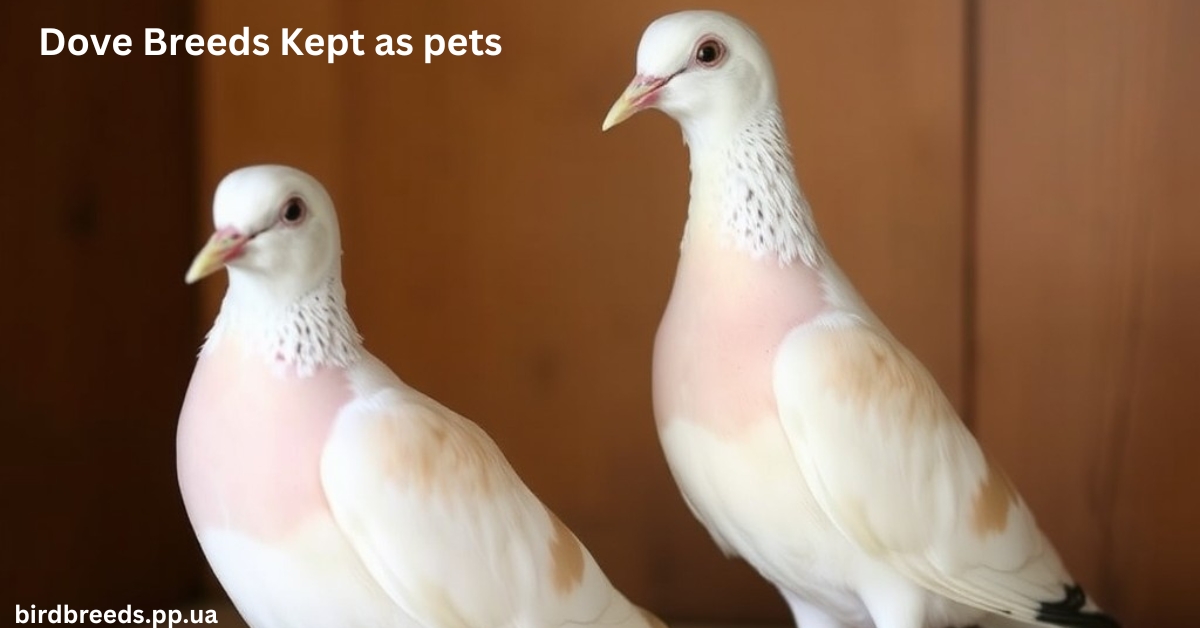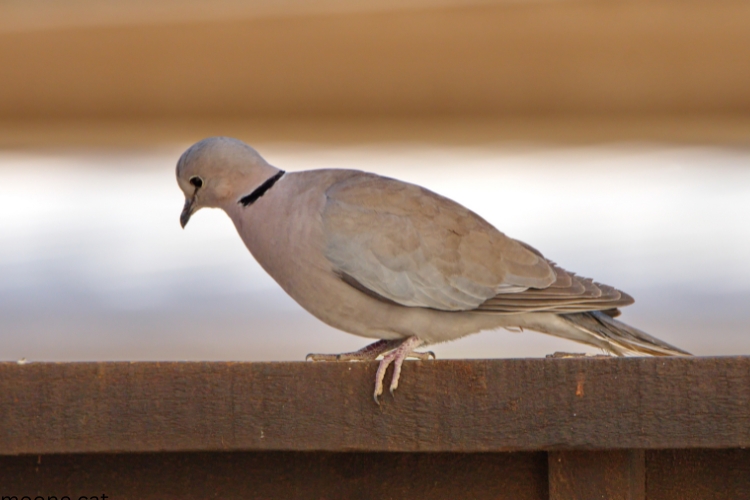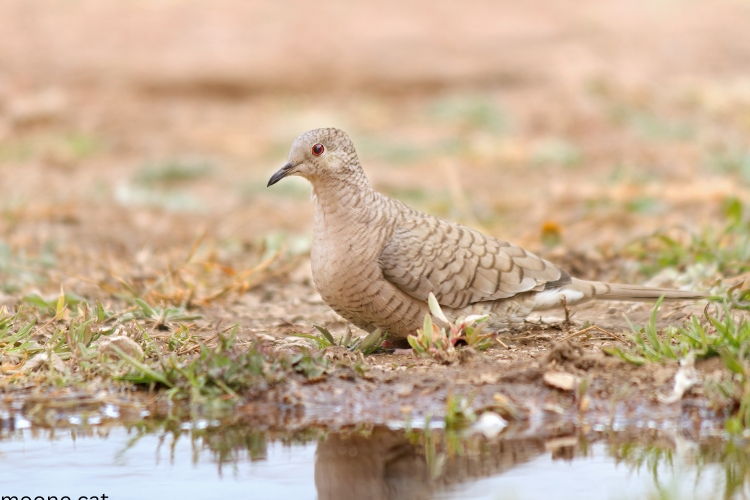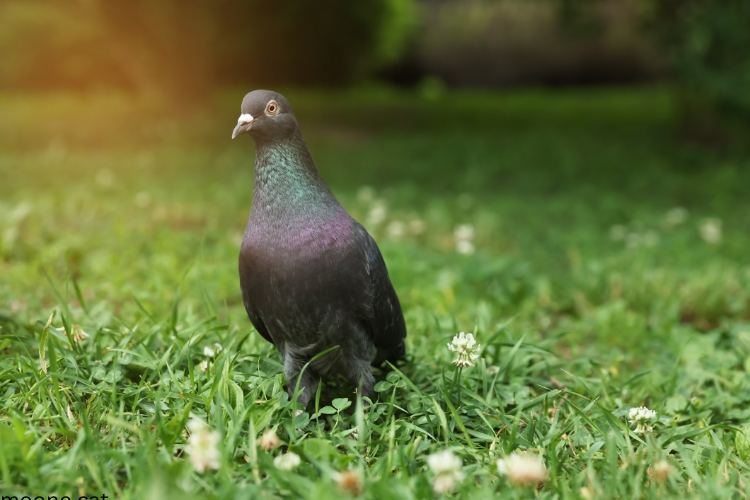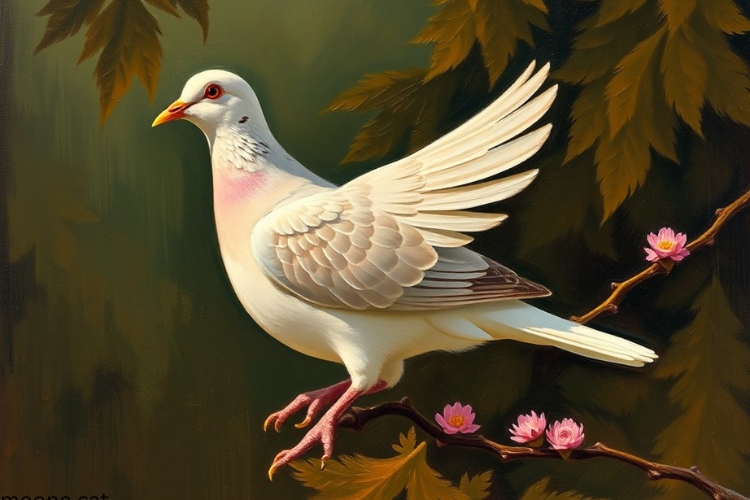Doves are known for their serene and gentle nature, making them popular pets for those who appreciate the calming presence of birds without the high maintenance often associated with more exotic species.
In this blog article, we will explore the various breeds of domesticated doves that are commonly kept as pets, their behaviors and personalities, and the care they require.
We’ll delve into the characteristics of popular breeds like the Diamond Dove and the Ring-necked Dove, as well as the essentials of dove care, to help you decide if a dove is the right companion for your home.
Key Takeaways
- Diamond Doves and Ring-necked Doves are among the most common dove species kept as pets due to their peaceful and docile nature.
- Doves require companionship, either from other doves or from their human caretakers, as they are inherently social birds.
- While doves are low-maintenance pets compared to larger parrot species, they still need adequate space, proper diet, and daily interaction.
- Prospective dove owners should consider their lifestyle, including time and space constraints, to ensure they can meet the needs of these birds.
- Doves generally have a quiet demeanor, with a lifespan of 10-15 years, making them suitable long-term companions for those who can provide a nurturing environment.
Understanding Dove Breeds and Their Characteristics
Diamond Dove: A Petite and Popular Choice
The Diamond Dove is one of the smallest doves kept as pets, often admired for its delicate beauty and long, slender tail. These birds are typically the size of a lovebird, measuring nine to 11 inches in length, with much of this length attributed to their distinctive tail.
Despite their small stature, Diamond Doves possess a strong and direct flight pattern. They are known for their peaceful and docile nature, making them a favorite among bird enthusiasts. These doves are often seen on the ground, where they exhibit a characteristic waddling gait.
Here are some key facts about Diamond Doves:
- Average height (adult): 9-11 inches
- Average weight (adult): 0-6.0 ounces
- Lifespan: 3-7 years
- Exercise: At least 1 hour a day
- Compatibility: Generally family-friendly and sometimes other pet-friendly
Their gentle nature and minimal space requirements make them an excellent choice for those looking for a low-maintenance pet bird. With proper care, Diamond Doves can be lively and enjoyable companions for many years.
Ring-necked Dove: Known for Its Distinctive Markings
The Ring-necked Dove, often celebrated for its elegant appearance and distinctive markings, is a favorite among dove enthusiasts. These doves are monogamous and mate for life, forming strong bonds with their partners. They are known to breed throughout the year, constructing nests high above the ground where they can safely raise their broods.
Ring-necked Doves are not only admired for their beauty but also for their gentle and peaceful demeanor. They make excellent pets due to their social and loving nature, often described as sweet, curious, and silly. With proper care, these birds can live for over two decades, making them a long-term companion for those willing to commit.
Here are some key facts about the Ring-necked Dove:
- Monogamous, pairing for life
- Breeds year-round
- Prefers nesting 10 feet or more above ground
- Male provides nesting materials
- Can live over 20 years
When considering a Ring-necked Dove as a pet, it’s important to understand their social requirements and long lifespan. These doves thrive on companionship, both from their human caretakers and from other doves, so it’s advisable to keep them in pairs or small groups.
Other Common Pet Dove Species: Homers, Tumblers, and Fantails
Beyond the Diamond and Ring-necked doves, there are other captivating species that are commonly domesticated. Homers, Tumblers, and Fantails stand out for their unique characteristics and are often chosen by enthusiasts for their distinctive traits.
Homers are known for their incredible homing instinct, making them popular for pigeon racing and long-distance communication in the past. Tumblers, on the other hand, are admired for their acrobatic flight patterns, which include a fascinating ability to perform backward somersaults while in the air. Fantails are easily recognized by their expansive, fan-shaped tails and are often kept for their aesthetic appeal.
When considering these breeds, it’s important to understand their specific needs. Here’s a quick overview:
- Homers: Require ample space for exercise and may need training for homing activities.
- Tumblers: Need opportunities to fly in a safe environment to showcase their tumbling skills.
- Fantails: Prefer spacious cages to accommodate their tail feathers and are less active flyers.
Each breed brings a unique dynamic to a home, and potential owners should consider their lifestyle before making a choice.
The Nature and Behavior of Domesticated Doves
Personality Traits of Pet Doves
Pet doves are known for their serene and gentle nature, making them ideal companions for those seeking a low-maintenance pet. Most species of doves exhibit a friendly demeanor when properly socialized and trained, ensuring a consistent and predictable companion in your home.
While there are over 300 species of birds classified as doves, common pet varieties like the Diamond Dove and the Ring-necked Dove share similar characteristics. They typically have small heads, rounded bodies, long wings, and pointed bills, with a significant portion of their weight attributed to their wings—approximately 40%.
Doves are inherently social creatures and thrive in the company of their own kind or human caretakers. Here’s a brief overview of their social needs:
- They prefer living in pairs or small flocks.
- A single dove can bond closely with its human if it lacks avian companionship.
- They require regular interaction to maintain their docile and calm temperament.
Understanding these personality traits is crucial for anyone considering a dove as a pet, as it reflects the level of care and interaction they will need to flourish.
Social Dynamics: The Importance of Companionship
Doves, like many other pet birds, thrive on social interaction and companionship. Having at least two doves together can prevent loneliness and encourage natural behaviors. While some birds may bond more closely with their human caretakers, doves often enjoy the company of their own kind.
It’s important to consider the social dynamics of your pet doves when introducing them to each other. Compatibility can vary based on factors such as age, temperament, and past experiences. Here are some general guidelines to ensure a harmonious environment:
- Introduce new doves to each other in a neutral space.
- Monitor their interactions closely at first.
- Provide ample space and resources to prevent competition.
Remember, the goal is to create a peaceful and engaging habitat where your doves can flourish together. Observing their interactions can also be a delightful aspect of pet ownership, as you witness the formation of bonds and social hierarchies within your aviary.
Interaction and Bonding with Human Caretakers
Doves, known for their sociable nature, often form strong attachments with their human caretakers. These bonds are genuine and extend beyond mere anticipation of feeding times. Regular interaction is crucial for fostering a deep connection between doves and their owners.
To enhance bonding, consider the following steps:
- Spend time daily with your dove, engaging in gentle handling and soft talking.
- Establish a routine for interaction, such as playtime or training sessions.
- Be patient and consistent, as trust-building takes time.
It’s important to note that doves thrive on social interaction and may require a companion bird for their well-being. If you’re unable to provide ample companionship, having another dove can significantly improve their quality of life. Remember, a happy and socially engaged dove is more likely to bond with you and exhibit positive behaviors.
Housing and Caring for Your Pet Dove
Cage Requirements and Setup
Providing a suitable habitat for your pet dove is crucial for its health and happiness. A minimum cage size of 24″ x 18″ x 18″ is recommended to comfortably accommodate a pair of doves. It’s essential to ensure that the cage is well-ventilated and has narrow bar spacing to prevent escapes or injuries.
When setting up your dove’s cage, consider the following essentials:
- A sturdy frame that can support perches and toys without bending or wobbling.
- A variety of perches at different heights and thicknesses to promote foot health.
- Feeders and water bottles that are easily accessible and can be cleaned regularly.
- A designated area for a bathing dish, as doves enjoy and benefit from regular baths.
Remember, the cage should be placed in a quiet, draft-free area of your home where your dove can observe daily activities without being in the direct line of traffic or loud noises.
Diet and Nutrition: What to Feed Your Dove
Providing a balanced diet is crucial for the health and longevity of your pet dove. A fortified dove seed mix should serve as the base of their diet, supplemented with a variety of greens and sprouted seeds to ensure they receive all the necessary nutrients. While doves primarily feed on seeds, it’s important to offer a diverse selection to mimic their natural foraging behavior.
In addition to their regular diet, doves may require grit to aid in digestion. Grit helps grind down the seeds in their gizzard, allowing for better nutrient absorption. Here’s a simple list of favorite foods that you can consider including in your dove’s diet:
- Hemp
- Wheat
- Foxtail
- Corn
- Pigweed
- Ragweed
Always ensure that fresh water is available and that feeding dishes are kept clean to prevent the spread of disease. Regularly monitor your dove’s health and consult with a veterinarian if you notice any changes in their eating habits or general well-being.
Exercise and Grooming Needs
Proper exercise and grooming are essential for the well-being of your pet dove. A spacious cage is crucial to allow your dove ample room to stretch its wings and stay active. The Animal Humane Society emphasizes the importance of exercise and enrichment for winged companions to maintain their mental health.
When it comes to grooming, doves require regular maintenance to keep their feathers in good condition. A variety of grooming supplies are available, including bird baths, nail and beak trimmers, and brushes. Below is a list of essential grooming items for your dove:
- Bird Baths
- Nail & Beak Trimmers
- Brushes and Combs
Additionally, maintaining a clean environment is important to prevent diseases. Regularly clean the cage and replace the liners to ensure a hygienic habitat for your pet.
Choosing the Right Dove Breed for Your Lifestyle
Assessing Your Time and Space Constraints
When considering adding a dove to your family, it’s crucial to assess both your time availability and the space you can dedicate to your new pet. Doves are social creatures that thrive on interaction, whether with their human caretakers or avian companions. While some species, like the Flock Companion doves, may require less daily interaction, they still benefit from a consistent schedule of care and attention.
Before making a decision, take into account the average size of the dove breed you’re interested in, as well as the cage size required to keep them comfortable and healthy. A general guideline is a minimum cage size of 24x18x18 inches for a pair of small doves. Additionally, consider the grooming needs and the suggested human interaction time per day, which can be around 10-15 minutes at a minimum.
Here is a quick comparison of the care aspects for potential pet dove owners:
- Average lifespan: 2-10 years depending on species
- Average size: 3-6 inches long depending on species
- Diet: Fortified finch seed mix, greens, sprouted seeds
- Cage size: Minimum 24x18x18 inches for 2-4 doves
- Grooming needs: Trim nails occasionally; provide bathing opportunities
- Time out of cage needed daily: Not required but beneficial
- Noise level: Can be noisy with singing
- Suggested human interaction time per day: 10-15 minutes minimum
Understanding the Commitment: Lifespan and Daily Interaction
When considering a pet dove, it’s essential to understand the commitment involved. Doves can live for 10-15 years, requiring a long-term dedication from their caretakers. Daily interaction is not just beneficial; it’s necessary for their well-being. Doves thrive on a minimum of 30 minutes of human interaction per day, which can include activities like gentle handling and socializing.
The care for a pet dove extends beyond companionship. Their diet consists of a fortified dove seed mix, greens, and sprouted seeds, ensuring they receive the proper nutrition. Grooming needs are modest, including regular nail trimming and providing opportunities for bathing. Additionally, doves need a minimum of 1-2 hours outside their cage each day to stretch their wings and exercise.
Here’s a quick overview of the daily and long-term commitments for keeping a pet dove:
- Average lifespan: 10-15 years
- Suggested human interaction time per day: 30 minutes minimum
- Time out of cage needed daily: 1-2 hours minimum
- Diet: Fortified dove seed mix, greens, sprouted seeds
- Grooming: Trim nails; provide bathing opportunities
Remember, the joy of keeping a dove as a pet comes with the responsibility of ensuring their happiness and health throughout their life.
Compatibility with Other Pets and Birds
When considering adding a dove to a household with other pets, it’s important to understand the social nature of these birds. Doves thrive in the company of their own kind and often do well with other bird species. However, careful introduction and monitoring are essential to ensure a harmonious environment.
Suitable Companions for Doves:
- Budgies
- Cockatiels
- Lovebirds
- Canaries
These birds, especially when introduced at a young age, can coexist peacefully with doves in a spacious aviary setting. It’s crucial to observe their interactions initially to prevent any potential conflicts. On the other hand, some birds, like finches, prefer living in small groups, and parakeets can be kept singly or in pairs. Understanding the specific needs and behaviors of each species is key to a successful multi-bird household.
In terms of compatibility with non-avian pets, doves are generally non-aggressive and can coexist with other gentle animals under supervision. However, it’s imperative to remember that doves are prey animals, and their safety should always be the top priority when around larger pets.
Conclusion
In summary, doves offer a unique blend of tranquility and companionship as pets. Species like the Diamond Dove and the Ring-necked Dove are particularly popular for their manageable size, gentle demeanor, and relatively simple care requirements. While they thrive in pairs or groups due to their social nature, individual doves can also form strong bonds with their human caretakers.
With a lifespan of 10-15 years, a diet that includes fortified seeds and greens, and a need for daily interaction and exercise, doves can be a delightful addition to a pet-loving household.
It’s important to consider the space and time you can dedicate to these serene birds, as they flourish with proper care and attention. Whether you’re an experienced bird enthusiast or a first-time pet owner, doves can make fantastic, low-maintenance companions that bring a sense of peace and joy to your home.
Frequently Asked Questions
What are some common dove breeds kept as pets?
Popular domesticated dove breeds include the Diamond Dove, Ring-necked Dove, Homers, Tumblers, and Fantails.
Do doves have a friendly personality?
Yes, doves are known for their peaceful, docile attitudes and can be quite charming. They are typically easy to train and bond with, making them fantastic pets.
Can doves be kept with other birds?
Doves are social birds and can be kept with other dove species or even other bird species, especially when housed in a spacious aviary. They enjoy companionship and will do well in pairs or flocks.
What are the care requirements for pet doves?
Pet doves need a fortified dove seed mix, greens, sprouted seeds, and a cage with a minimum size of 30x18x18 inches for one dove. They require regular nail trims, bathing opportunities, and a minimum of 1-2 hours of time out of the cage daily.
How much human interaction do doves need?
Doves are sociable and need plenty of interaction with their caretakers. A suggested minimum of 30 minutes of human interaction per day is recommended for a healthy bond.
What is the average lifespan and size of a pet dove?
The average lifespan of a pet dove ranges from 10-15 years, and they can grow 7-12 inches long depending on the species.

